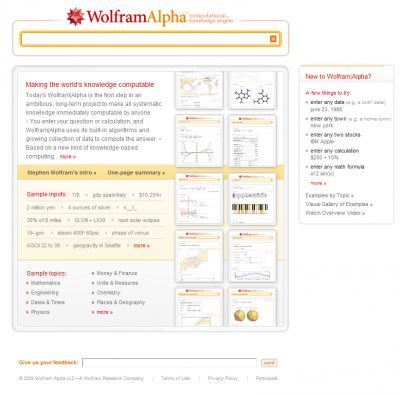Microsoft's Bing teams up with WolframAlpha

Microsoft's new search engine Bing, which is seeking to chip away at Google's dominance in Internet search, is teaming up with WolframAlpha, another rival for the Google crown.
WolframAlpha, which was launched in mid-May, announced that starting on Wednesday, Bing would incorporate results from WolframAlpha in answers to certain search queries.
"WolframAlpha's knowledge, computed from expertly curated data, will enrich Bing's results in select areas across nutrition, health, and advanced mathematics," WolframAlpha said in a blog post.
"Bing will be able to seamlessly access the tens of thousands of algorithms and trillions of pieces of data from WolframAlpha, and directly incorporate the computations in its search results," it said.
WolframAlpha, which is named after the man behind the venture, British-born computer scientist and inventor Stephen Wolfram, calls itself a "computational knowledge engine" rather than the traditional search engine.
Unlike Google, which takes a query and uses algorithms to scour the Web and return a series of links to relevant websites, WolframAlpha.com takes a query and crunches through its databases to return answers.
Bing's tie-up with WolframAlpha is one of several moves Microsoft has made recently in a bid to challenge Google in the multi-billion-dollar search and advertising market.
Microsoft entered into a 10-year Web search and advertising partnership with Yahoo! in July that set the stage for a joint offensive against Google.
Since unveiling Bing in June, Microsoft has also begun integrating messages from hot micro-blogging service Twitter into Bing and plans to do the same with status updates from Facebook.
Google dominates online search in the United States with a nearly 65 percent share of the market followed by Yahoo! with 18.8 percent and Bing with 9.4 percent, according to September figures from industry tracking firm comScore.
Join our commenting forum
Join thought-provoking conversations, follow other Independent readers and see their replies
Comments
Bookmark popover
Removed from bookmarks